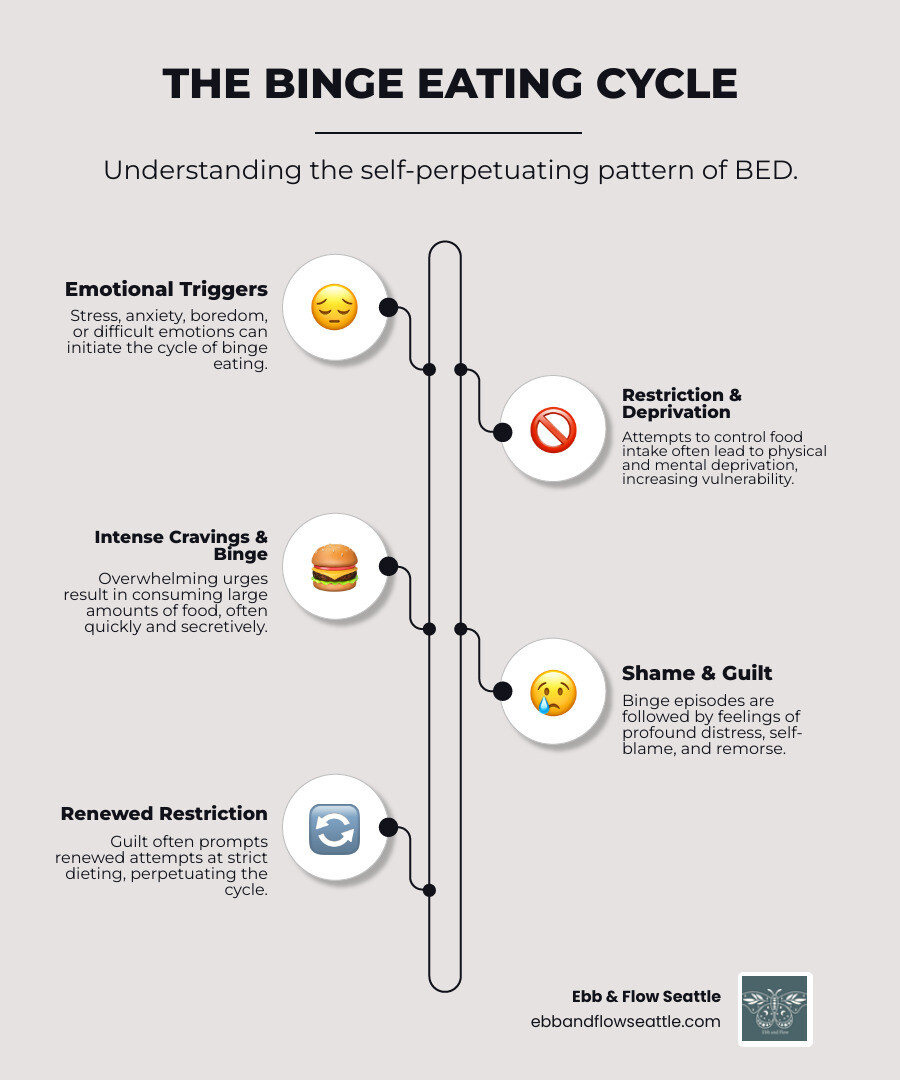Binge Eating Therapy Washington: Real Healing for Women Who Are Done Pretending They're Fine

Finding Your Way Back to Food Freedom in Washington State
If you're here, chances are you're exhausted from the cycle. The secret eating, the shame spirals, the promising yourself "tomorrow will be different" only to find yourself right back in the same painful loop. You're not broken, and you're definitely not alone.
At Ebb & Flow Seattle in Lynnwood, I’m a therapist who specializes in eating disorder treatment and truly understands what it’s like to use food to cope when life feels overwhelming. Using evidence-based approaches—Acceptance and Commitment Therapy, Brainspotting, and Intuitive Eating—I help women break free from binge eating patterns, build trust with their bodies, and reclaim their power.
What I Offer for Eating Disorder Recovery:
- Individual therapy sessions focusing on eating disorder treatment (online and in-person)
- Binge Eating Group therapy for ongoing support
- Women's Group Therapy
- 12-Week Health Group
- Intensive sessions for deeper healing
My practice serves women throughout Washington State who are ready to do the real work of healing—not just managing symptoms of eating disorders, but addressing what's underneath the surface.
The Truth About Binge Eating Disorder: It's Not About Willpower
Let me be straight with you: binge eating disorder isn't a character flaw or a lack of self-control. It's your nervous system's way of coping with something that feels too big to handle. Your mind learned to use food to manage overwhelming emotions, trauma, or the impossible standards our culture places on women's bodies.
I see you—the woman who appears to have it all together on the outside while fighting mental health concerns every single day. You might be the overachiever, the people-pleaser, the one everyone turns to when things get tough. But inside, you're exhausted from constantly performing and never feeling like you're enough.
Mental health providers who specialize in eating disorder recovery understand that this struggle affects every aspect of your life. The path to long term recovery requires addressing both the eating disorder symptoms and the underlying emotional patterns.
What Binge Eating Really Looks Like
Binge eating shows up differently for everyone, but there are common patterns I see in my disorder treatment practice:
The Physical Experience:
- Eating large amounts of food quickly, often until you're uncomfortably full
- Feeling completely out of control during these episodes
- Eating alone or in secret because of shame
- Continuing to eat even when you're not physically hungry
The Emotional Aftermath:
- Intense guilt and self-criticism
- Feeling disgusted with yourself
- Anxiety about your body and weight
- Depression and isolation
- Planning your next "fresh start" or diet
The Hidden Triggers:
- Stress from work, relationships, or family expectations
- Emotions you haven't learned healthy ways to process
- The restriction-binge cycle created by dieting
- Perfectionism and the need to always be "good"
- Mental health concerns that haven't been properly addressed
Sound familiar? You're not imagining it, and you're not crazy for feeling overwhelmed by it all.

Why Traditional Approaches Often Fall Short
Here's what pisses me off about a lot of eating disorder treatment: healthcare professionals who sit back and just say "mmm-hmm, and how does that make you feel?" while you're drowning. That's not my style.
I'm fully engaged in every session because this work matters too much for half-hearted efforts. I'll call you on your patterns (with love), challenge the beliefs that keep you stuck, and give you real tools to work with between sessions. This treatment philosophy ensures you feel safe while doing the deep work necessary for recovery.
The Diet Culture Connection
Most women I work with have been dieting in some form since they were teenagers. Diet culture teaches us that our bodies are problems to be solved, that we can't trust our hunger, and that we need external rules to control our eating.
This creates the perfect storm for eating disorders:
- Restriction leads to feeling deprived
- Deprivation triggers intense cravings
- Cravings feel "wrong," so you try to fight them
- Eventually, your body rebels with a binge
- Shame kicks in, and you promise to "be better" tomorrow
- The cycle starts all over again
Breaking this cycle requires more than willpower—it requires comprehensive eating disorder treatment that heals your relationship with food, your body, and yourself.
My Approach: Real Healing, Not Quick Fixes
I use evidence based treatment methods that actually work for eating disorder recovery. But more than that, I bring my whole self to this work because I believe healing happens in relationship. My treatment philosophy centers on creating a space where you can feel safe to explore the deeper issues beneath your eating disorder.
Acceptance and Commitment Therapy (ACT)
ACT helps you stop fighting your difficult emotions and start making choices based on what actually matters to you. Instead of eating to avoid anxiety, we learn to sit with the discomfort while taking actions that align with your values.
This evidence based treatment approach isn't about positive thinking or pretending everything's fine. It's about building psychological flexibility so you can handle life's challenges without turning to food for comfort.
Brainspotting
Sometimes traditional eating disorder treatment can only take us so far. Brainspotting is a powerful approach that helps process trauma and emotional pain stored in your body. Many of my clients experience profound shifts that they couldn't access through conventional therapy alone.
If you've experienced trauma (and many women with eating disorders have), this modality can help you heal at a deeper level than just talking about your problems.
Intuitive Eating Therapy
This is the foundation of everything I do in eating disorder treatment. Intuitive Eating isn't another diet—it's the complete opposite. It's about learning to trust your body's wisdom again and rejecting the diet mentality that contributes to eating disorders.
We work on:
- Giving yourself unconditional permission to eat all foods
- Reconnecting with your natural hunger and fullness cues
- Finding satisfaction in your eating experiences
- Using kindness instead of criticism as motivation
- Honoring your body's needs without judgment
- Building a positive relationship with food and movement
Person-Centered Therapy
You are the expert on your own life. My job isn't to fix you or tell you what to do—it's to create a space where you can reconnect with your own wisdom and strength. This treatment philosophy ensures you feel safe to explore difficult emotions and experiences.
This approach emphasizes your unique experiences and empowers you to find your own answers. I'm here to support, challenge, and guide you, but ultimately, you're in the driver's seat of your recovery.

Individual or Group Therapy: Finding Your People
Individual Therapy: Your Sacred Space
In our one-on-one eating disorder treatment sessions, we dive deep into your personal history, unique triggers, and the beliefs that keep you stuck. This is where we do the messy, vulnerable work of healing from eating disorders.
I provide a consistent day and time that's yours—no scheduling session by session. We plan three months at a time because eating disorder recovery needs a container you can count on. This ongoing support is essential for long term recovery.
Group Therapy: The Power of Connection
There's something magical that happens when women with similar struggles come together. In my Binge Eating Group and Women's Group Therapy, you'll discover you're not the only one fighting this battle. These support groups provide ongoing support that's crucial for disorder recovery.
Group therapy offers:
- Connection with others who truly understand eating disorders
- Reduced shame and isolation
- Different perspectives on recovery
- Accountability and ongoing support between sessions
- The healing that comes from helping others
Many of my clients are surprised by how much they learn from other group members in these support groups. Sometimes hearing someone else's story helps you see your own situation more clearly.
Integrating Nutrition and Mental Health
True healing from eating disorders requires addressing both your relationship with food and the underlying emotional patterns. This isn't about meal plans or counting calories—it's about creating peace between your mind and body. Healthcare professionals who understand eating disorder recovery know that mental health and nutrition are deeply connected.
Making Peace with All Foods
One of the hardest parts of eating disorder recovery is learning that no foods are off-limits. I know this sounds terrifying if you've been living by food rules for years, but restriction is what fuels eating disorders.
When you give yourself genuine permission to eat all foods, you remove their power over you. Yes, you might eat a lot of previously "forbidden" foods at first. This is normal and necessary for breaking the restriction-binge cycle that characterizes many eating disorders.
Reconnecting with Your Body's Wisdom
Your body knows how to nourish itself when we get diet culture's voice out of your head. In eating disorder treatment, we work on:
- Recognizing true physical hunger versus emotional triggers
- Eating when you're hungry and stopping when satisfied
- Finding foods that taste good AND make your body feel good
- Moving your body in ways that feel joyful, not like excessive exercise
- Building a positive relationship with movement and health
Emotional Regulation Beyond Food
Food might have been your primary coping mechanism, but it doesn't have to stay that way. Together in eating disorder treatment, we develop a toolkit of strategies for managing difficult emotions:
- Mindfulness practices that help you stay present
- Breathing techniques for anxiety and overwhelm
- Boundary setting to protect your energy
- Creative outlets for self-expression
- Connection with your spiritual side (if that resonates with you)
- Ongoing support strategies for maintaining recovery

Virtual Eating Disorder Treatment: Healing from Anywhere in Washington
I offer both in-person sessions in Lynnwood and virtual eating disorder treatment throughout Washington State. Many of my clients prefer online eating disorder treatment because they can access specialized care from the comfort of their own homes.
Virtual eating disorder treatment eliminates barriers like commute time, childcare concerns, or the anxiety of being seen entering a therapy office. Research shows it's just as effective as in-person treatment for eating disorders and provides the same level of ongoing support.
Whether you're in Seattle, Spokane, Tacoma, or anywhere else in Washington, you can access disorder treatment in Washington that specializes in eating disorder recovery.
What to Expect: Your Journey to Food Freedom
Getting Started with Eating Disorder Treatment
Free Consultation: We'll have a brief phone call to see if we're a good fit for eating disorder treatment. This is your chance to ask questions and get a feel for my approach to disorder recovery.
Simple Onboarding: I'll get you set up in my secure portal where you can complete paperwork at your own pace. This helps you feel safe from the very beginning of treatment.
Extended First Session: Our initial meeting is longer so we can connect, discuss your history and goals, and start building the foundation of trust necessary for eating disorder recovery.
Consistent Schedule: You'll get a regular day and time that remains yours, scheduled months in advance to create stability essential for long term recovery.
The Healing Process in Eating disorder Treatment
Recovery from eating disorders isn't linear, and I won't pretend it's easy. There will be setbacks, breakthroughs, and everything in between. My job is to walk alongside you through all of it, providing the ongoing support necessary for disorder recovery.
Some sessions we'll focus on practical skills like meal planning without restriction. Others, we'll dive into deeper emotional work around trauma, family patterns, or self-worth. Sometimes we'll just sit with whatever's coming up for you that day. This flexible approach to treatment ensures you feel safe to explore whatever needs attention.
The goal isn't perfect eating—it's peaceful eating. It's developing a positive relationship with food and your body based on trust, not fear. Healthcare professionals who specialize in eating disorder recovery understand this distinction.

Common Questions About Eating Disorder Recovery
How Long Does Eating Disorder Treatment Take?
There's no magic timeline because eating disorder recovery is deep, transformative work. We're rewiring patterns that might have been decades in the making. Some clients see significant shifts within months, while others need a year or more of treatment.
What matters most is consistency. The clients who show up week after week and do the work between sessions see the most profound changes in their eating disorder recovery. Your brain is literally creating new neural pathways, and that takes time and ongoing support.
Is Full Recovery from Eating Disorders Really Possible?
Absolutely. I see eating disorder recovery happen regularly in my practice, and I believe it's possible for you too.
Recovery doesn't mean having a "perfect" relationship with food (that doesn't exist). Long term recovery means:
- Eating without guilt or shame
- Trusting your body's signals
- Using food for nourishment and pleasure, not emotional numbing
- Having tools to handle difficult emotions without turning to food
- Feeling at home in your body
- Living authentically instead of performing perfection
- Maintaining a positive relationship with health and movement
What If I've Tried Eating Disorder Treatment Before?
If previous treatment didn't work, it doesn't mean you're hopeless. It likely means the approach or therapeutic relationship wasn't right for your specific needs in eating disorder recovery.
I'm not a therapist who just sits back and nods. I'm actively engaged, I'll challenge you with compassion, and I'll guide you through the tough stuff. A different approach to eating disorder treatment and genuine connection can change everything. Many healthcare professionals understand that finding the right fit is crucial for successful disorder recovery.
Support Groups and Ongoing Support
Recovery from eating disorders thrives with community connection. Beyond individual eating disorder treatment, I offer several support groups that provide ongoing support throughout your recovery journey:
Binge Eating Group: Connect with other women experiencing similar struggles with eating disorders. These support groups offer practical strategies and emotional support.
Women's Group Therapy: Address broader mental health concerns while building connections with other women working on their recovery.
12-Week Health Group: Focus on building a positive relationship with health, movement, and self-care practices.
Support groups provide a level of ongoing support that individual therapy alone cannot offer. The connections formed in group therapy often become lasting sources of strength and encouragement in long term recovery.
Ready to Begin? Your Next Steps
If you're a woman in Washington who's tired of the binge-restrict cycle and ready for real eating disorder treatment, I'm here to support you. This work is my calling, and I take my role as a healer as seriously as I take my role as a mother.
You deserve to feel at peace with food and at home in your body. The life where you can trust yourself completely—where food is just food and not the enemy or your only comfort—is absolutely possible through dedicated eating disorder recovery work.
Here's how to get started with eating disorder treatment:
- Reach out for a free consultation to see if we're a good fit for your disorder recovery journey
- Ask any questions about my approach to eating disorder treatment or what therapy involves
- If it feels right, we'll schedule your first session
- Begin the journey back to yourself with ongoing support
Your healing matters. Your story matters. And the woman you're becoming—free from food obsession and shame—is already inside you, waiting to emerge through eating disorder recovery.
Eating disorder treatment in Washington is available to support you wherever you are in the state. Whether you choose virtual eating disorder treatment or in-person sessions, you can access the specialized care you need.
Ready to take that first brave step toward disorder recovery? Let's explore whether we're meant to do this sacred work together. Your journey toward food freedom and long term recovery starts with a single, brave step. You're ready for this.
